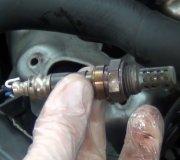Yes, exhaust gases are the only thing that are suppose to go through the exhaust system. Normal operating temps for the catalytic converter is 1,200 degress F. It reaches this temp. Pretty quickly to convert the emission gases.
The expansion/contraction noises that you inquire about usually happen during the first 3-5 minutes or so due to the different chemical make-ups of the all the different metals on the engine. This will also happen after the engine is shut off due to different cooling times. But as these metals age the expansion/contraction times lessen due to the dissimilar metals being harden and settleing in on their enviroment. Example being a new vehicle will have a lot more of this going on while the metals harden then would an older vehicle.
You stated that you car has approx. 136,000 miles on it, and it's pretty safe to assume that the dissimilar metals have pretty much settled in.
What can occur over time is that the gaskets between these dissimilar metals wears out from the expansion/contraction, which could give you an exhust leak at the manifold, or in intake leak on the intake gasket.
As far as the heatshield go, they are there to protect surrounding componets from the excessive heat, and as with all the other dissimilar metals, they will eventually settle in also.
So if you are gettiing this noise as soon as you start the vehicle and it continues to be there while driving it's safe to assume that it's not an expansion/contraction issue.
Here's a few thoughts. Sometimes when bearings go bad in a component with pulleys, such as the generator or water pump, they can make a clicking/popping noise and will contiune to make this noise from the start. If the exhaust gasket is bad and leaking, it will make a similar noise from the start.
Does the noise change with engine RPM's? Is the first question.
Hope this helps, let me know how you make out.
Saturday, February 20th, 2010 AT 12:14 PM


